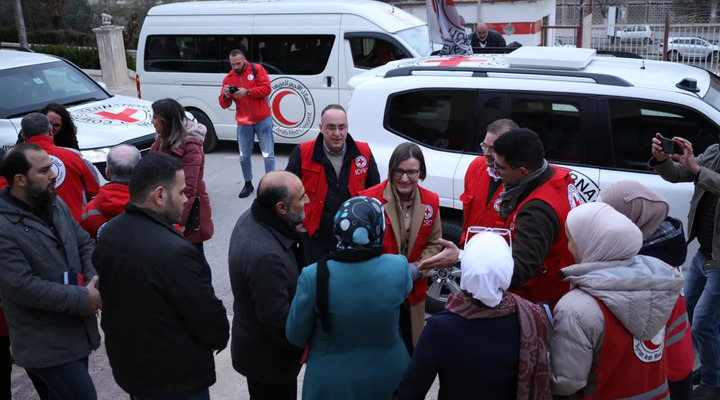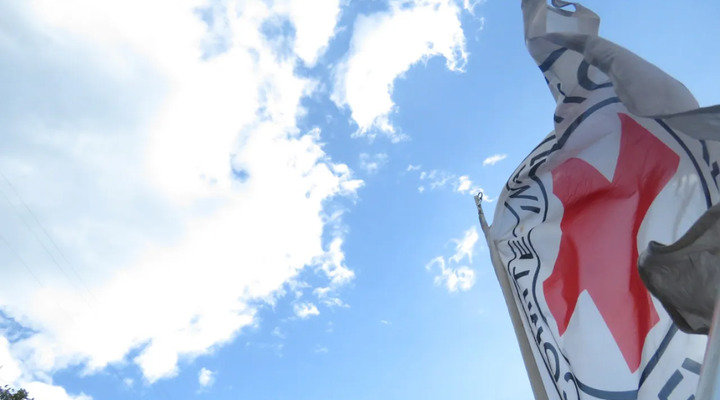Red Cross is stepping up prison visits in Somalia
Nairobi (ICRC)—The International Committee of the Red Cross (ICRC) is expanding its visits to detention places across Somalia in response to the escalation of the armed conflict. Fighting across the country intensified in the past year and is expected to pick up after a lull caused by El Nino rains at the end of 2023. Under its international mandate, the ICRC monitors the treatment and conditions of people detained in relation to security offences.
"We witness an intensification of the conflict in Somalia, and we expect the detention population will also increase. As a result, our teams have increased their visits to detainees to ensure they are treated humanely and live in dignified conditions," says Samer Jarjouhi, who oversees ICRC programs in Somalia.
In the past two years, the organization has been expanding the number of visits and the number of detention facilities where it works in Somalia. In 2023, it visited 15 facilities compared to 10 in 2022. As a result, the number of detainees ICRC delegates interviewed increased by almost 20%, from 3,770 to 4,495. The number is expected to grow again this year in line with the organization's commitment to ensuring the protection of people detained in relation to armed conflict and violence.
One crucial aspect of the ICRC's work is helping detainees communicate with their families. Its delegates help exchange short messages containing family news between detainees and their close family members.
During its visits, the ICRC assesses detainees' treatment and living conditions, including access to necessities like food, water, fresh air, and healthcare. The organization works with prison authorities to ensure that detention conditions correspond to international norms and that detainees are treated with dignity. It also provides material support to detention facilities to improve medical care and hygiene. Last year, the ICRC delivered hygiene items to 15 places of detention and provided two stoves and seven chimneys for the kitchen it constructed for Mogadishu Central Prison.
"We have worked with the ICRC for many years and have a good working relationship. The ICRC supports the prison with hygiene items and medicine," says Dahir Abdulle, Prison Director for Mogadishu Central Prison.
The ICRC visits detainees in over 90 countries and territories around the world. In Somalia, it started visiting detention facilities in 1977 during the Ogaden War. It is currently providing Ramadan food assistance to almost 4,500 detainees.
Download this footage from ICRC Video Newsroom
For further information, please contact:
Alyona Synenko (English/French), ICRC Nairobi, +254 716 987 265, asynenko@icrc.org
Abdikarim Mohamed (English/Somali), ICRC Somalia, +254 770 171 756, mabdikarim@icrc.org
LOGLIST
|
On-screen credit |
ICRC written or logo attached to story
|
|
Shooting date
|
10th & 11th March 2024
|
|
Country/Location
|
Mogadishu, Somalia |
|
Language
|
English & Somali |
|
Producer |
Anisa Hussein |
|
Cameraperson
|
Abdikarim Mohamed |
|
Copyright / Details of restriction if applicable |
ICRC access all |
|
Length
|
04:02 |
|
TIME CODE |
LOCATION / IMAGE / TIMECODED TRANSCRIPT OF SOUNDBITES |
|
00:00 – 00:09 |
Close up of prison cell being locked. |
|
00:09 – 00:16 |
Shots of detainees siting inside a cell. |
00:16 - 00:31 |
Shots of detainee reading the Quran inside a cell. |
00:31 - 00:56
|
Shots of detainee playing dominoes inside a cell.
|
|
|
|
|
00:56 - 01:02 |
Detainees speak to an ICRC personnel from inside their cell.
|
|
01:02 - 01:08 |
Shot of ICRC personnel speak to detainees. |
|
01:08 - 01:14 |
Medium shot of ICRC personal speaking to detainees in their cell. |
|
01:14 - 01:21 |
Shot of ICRC personnel conducting a confidential interview with a detainee outside of the cells. |
|
01:21 - 01:29 |
ICRC personnel touring the prison facility. |
|
|
Soundbite (Samer Jarjouhi – Head of Programs & Prevention, ICRC Somalia) |
|
01:29 - 01:35 |
“As we witness an intensification of the conflict in Somalia, we expect that the detention population in the country will also increase.”
|
|
01:35 - 01:45 |
“As a result, ICRC has increased its detention visits across the country to ensure that detainees are treated humanely and are living in dignified conditions.” |
|
01:45 - 01:53 |
ICRC personnel having a discussion with prison authorities while touring the prison.
|
|
|
Soundbite (Dahir Abdulle Raage – Prison Director, Mogadishu)
|
|
01:53 - 01:58 |
“The ICRC has been working with us for many years.” |
|
01:58 - 02:03 |
“It supports with hygiene items and medicine.” |
|
02:03 - 02:08 |
Shot of detainees leaving their cell. |
|
02:08 - 02:14 |
Shot of open area outside the prison cells with drinking water cans on the ground. |
|
02:14 - 02:19 |
Shot of detainees drinking water bottles as detainees walk to their cells with bags of ICRC Ramadan assistance in the background. |
|
02:19 - 02:25 |
ICRC personnel touring prison kitchen. |
|
02:25 - 02:30 |
Wide shot of prison kitchen. |
|
02:30 - 02:43 |
Shots of food preparation in the prison's kitchen. |
|
02:43 - 02:58 |
Shots of a prison cell with detainees’ belongings. |
|
02:58 - 03:04 |
ICRC personnel speaking to a group of detainees gathered for a Ramadan assistance. |
|
|
Soundbite (Dahir Abdulle Raage – Prison Director, Mogadishu)
|
|
03:04 - 03:11 |
“Detainees, every one of them, talks freely with the ICRC.” |
|
03:11 - 03:14 |
“They even enter in the cells. there's no problem at all.” |
|
03:14 - 03:20 |
Shot of detainees walking back to their cells with bags of ICRC Ramadan assistance. |
|
03:20 - 03:30 |
Shot of a prison cell with detainees’ belongings. |
|
|
Soundbite (Samer Jarjouhi – Head of Programs & Prevention, ICRC Somalia)
|
|
03:30 - 03:34 |
“Today we're in Mogadishu Central Prison where the ICRC conducts regular detention visits.” |
03:34 - 03:43
|
“In addition to Mogadishu Central Prison ICRC has visited over 15 places of detention across Somalia last year reaching close to 5,000 detainees.” |
03:43 - 03:49
|
“Our main aim in detention is to ensure that detainees are treated humanely and have dignified living conditions.” |
03:49 - 04:02
|
“This entails access to fresh air, access to fresh water, access to medical services and facilities, and most importantly to ensure that detainees have access to families and their family contacts.” |
ENDS

